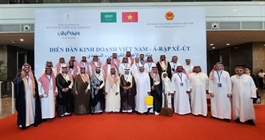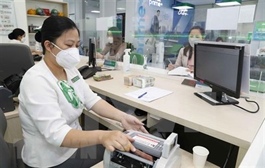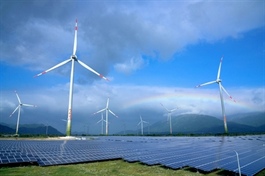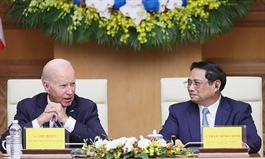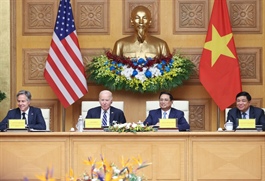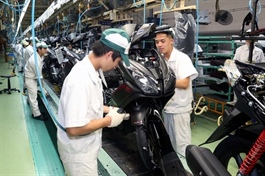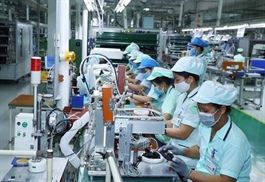Billion-dollar deals signed during US President Biden’s visit to Vietnam
Billion-dollar deals signed during US President Biden’s visit to Vietnam
President Joe Biden's state visit to Vietnam offers an opportunity for both countries to strengthen ties in areas such as investment, innovation, chip technology, semiconductors, and sustainable transportation.
During President Joe Biden's visit, numerous Vietnamese companies have successfully secured cooperation agreements and investment deals amounting to billions of dollars with major US corporations.
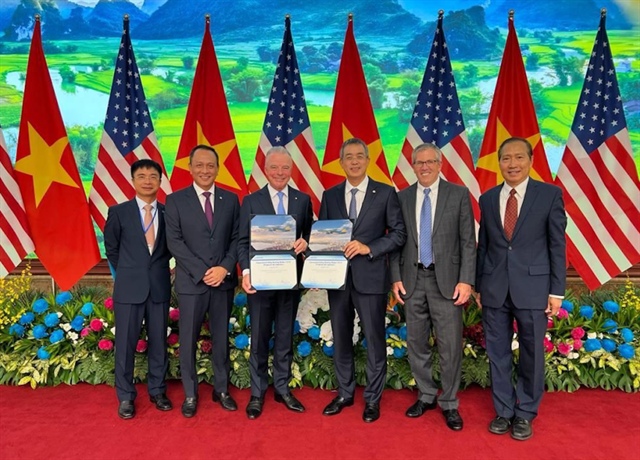
Representatives of Vietnam Airlines and Boeing sign the $10-billion deal during Biden's visit to Vietnam. Source: VNA |
US President Joe Biden's state visit to Vietnam on September 10-11 provides an opportunity for both nations to bolster their relations in various sectors, including investment, innovation, chip technology, semiconductors, and sustainable transportation.
During this visit, several investment cooperation agreements and initiatives were inked by Vietnamese and US companies to advance Vietnam-US Comprehensive Strategic Partnership. For instance, the national flag carrier Vietnam Airlines and Boeing signed a $10 billion memorandum of understanding in the aviation services sector, which involves the purchase of fifty 737 Max aircraft. These aircraft are expected to be delivered between 2027 and 2030.
Vietjet Airlines also entered into a $0.55 billion aircraft sponsorship agreement with Carlyle, a prominent US financial group. Under this arrangement, Carlyle Aviation Partners, a division of the Carlyle Group, will provide financial support for Vietjet's order of 200 aircraft from Boeing, including the 737 Max series.
Founded in 2002, Carlyle Aviation Partners is an aircraft finance and leasing company. It manages a fleet of 396 aircraft across 59 countries worldwide, with assets over $385 billion.
Furthermore, Vietjet and Boeing agreed to commence the delivery of the first batch of aircraft from the order for 200 B737 Max airplanes, signed in 2016 during President Barack Obama's visit to Vietnam. This order, valued at over $25 billion, will be fulfilled over the next five years, with the first 12 aircraft scheduled for delivery in 2024.
In the realm of finance and banking, local lender VPBank announced on September 10 that it had secured a $300 million 7-year bilateral loan from the DFC Group. This loan aims to fortify its capital base and advance its sustainable and robust financial activities. Additionally, DFC granted a similar loan of $100 million to TPBank.
These loans are intended to enable both banks to continue their sustainable financial operations, including supporting SMEs and women-owned small and medium-sized enterprises, and shift their investment portfolios towards activities that address climate change and low-carbon emission technologies.
In addition to receiving capital inflows from the US, Vietnamese businesses have also increased their investments in the US market. FPT Chairman Truong Gia Binh announced on September 11 that he plans to invest $100 million and employ nearly 1,000 people in the US by the end of the year. He has also proposed that the US Government foster the semiconductor ecosystem in Vietnam.
Through ongoing investments, FPT expects to create over 3,000 jobs by 2028 and generate $1 billion in revenue from the US market by 2030.
Furthermore, in conjunction with its investment plan, the group has unveiled a comprehensive strategic partnership with LandingAI, a company specializing in machine vision and artificial intelligence (AI) based in Silicon Valley, to expedite the integration of AI into the education system at FPT Education.
Earlier, in the Joint Leaders' Statement elevating the US-Vietnam relationship to a comprehensive strategic partnership, General Secretary Nguyen Phu Trong and President Joe Biden pledged to create favorable conditions and expand market access for each other's goods and services. They also committed to addressing market access barriers through the Trade and Investment Framework Agreement.
Both leaders expressed support for enhancing the non-discriminatory and rules-based multilateral trading system, with a central role played by the World Trade Organization (WTO).
The US pledged to increase support for Vietnam in manufacturing, developing high-quality physical and digital infrastructure, facilitating an equitable energy transition, promoting sustainable and smart agriculture, and assisting Vietnam's integration into regional and global supply chains in a sustainable manner. The US is also committed to supporting Vietnam in training and cultivating a high-tech workforce.
The two nations have unveiled plans to initiate programs for human resource development in the semiconductor sector, with an initial seed funding of $2 million provided by the US Government, alongside support from the Vietnamese Government, the private sector, and potential future contributions.
Vietnam and the US officially reestablished diplomatic relations in July 1995, and the partnership was elevated to a comprehensive level in July 2013. The bilateral trade between Vietnam and the US reached nearly $124 billion last year, marking a remarkable 275-fold increase over 27 years.
The US is Vietnam's primary export market and second-largest trading partner. Conversely, Vietnam is the seventh-largest trading partner of the US globally and the first within ASEAN.



